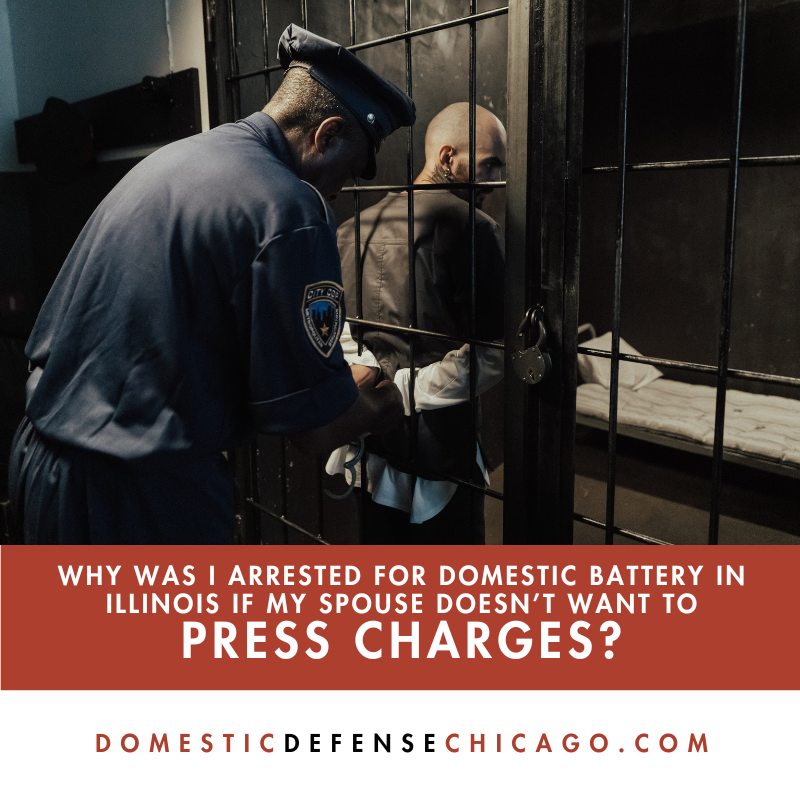Why Was I Arrested for Domestic Battery in Illinois If My Spouse Doesn’t Want to Press Charges?

Even if the alleged victim doesn’t want to press charges, Illinois prosecutors can still pursue a domestic battery case.
If you’ve been arrested for domestic battery in Illinois—even if your spouse says they don’t want to press charges—you’re not alone. This is one of the most common and misunderstood situations in domestic violence cases.
In Illinois, the decision to pursue or drop charges lies entirely with the prosecutor, not the alleged victim. Even if your spouse refuses to cooperate, you could still face prosecution and potential jail time. Here’s what you need to know and how to protect your rights.
Why Was I Arrested If My Spouse Doesn’t Want to Press Charges?
Domestic battery is a criminal offense under Illinois law. Once the police are called and believe there is probable cause, they can make an arrest—regardless of what the alleged victim says. After that, it’s up to the State’s Attorney to decide whether to press charges, not the accuser.
This system is in place to protect victims who might feel pressured to stay silent or drop the case. Even if the accuser recants or refuses to testify, prosecutors can still proceed using other types of evidence. Learn more in our article on What Happens If an Alleged Victim Doesn’t Want to Press Charges.
Can the Victim Drop the Charges?
No. The alleged victim does not have the legal authority to drop charges. Only the prosecutor has that power.
In many cases, even if the accuser submits a written request to drop the case, the State’s Attorney may continue forward if they believe there’s enough evidence to get a conviction.
Prosecutors may use evidence such as:
- Police reports and officer testimony
- Bodycam footage
- 911 call recordings
- Medical records or photos of injuries
- Witness statements
What Happens If the Victim Refuses to Cooperate?
The case may still move forward. While it’s harder for the prosecution without a cooperating witness, it’s not impossible. The State may subpoena the alleged victim or proceed based on independent evidence.
It’s important to understand that ignoring a subpoena can result in legal consequences for the accuser as well.
Steps to Take If You’ve Been Arrested for Domestic Battery
If you are facing domestic violence charges, take the following steps immediately:
1. Do Not Talk to Police Without an Attorney
Exercise your right to remain silent. Anything you say can be used against you in court. Politely ask for a lawyer and say nothing further.
2. Contact a Criminal Defense Lawyer Right Away
An experienced attorney will help you understand your rights, evaluate the strength of the prosecution’s case, and guide you through the legal process.
3. Obey All Court Orders
If a judge issues an order of protection or a no-contact order, follow it exactly. Violating court orders can lead to new criminal charges and complicate your defense.
4. Preserve Evidence
Save any text messages, voicemails, or emails that may support your side of the story. Write down your recollection of events as soon as possible while the details are fresh.
Conclusion
Being arrested for domestic battery—even when your spouse doesn’t want to press charges—can be confusing and stressful. In Illinois, prosecutors decide whether to pursue charges, and they often continue cases even when the accuser is uncooperative.
Your best defense is early legal intervention. An experienced attorney can help protect your rights, challenge the evidence, and guide you toward the best possible outcome.
Need help? Contact us today for a free consultation.






Leave A Comment
You must be logged in to post a comment.